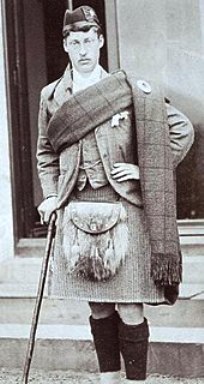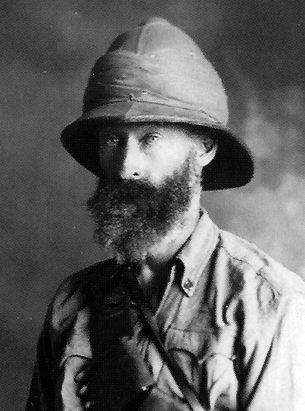Back to search results
Name: CUNINGHAME, Richard John DSO 'R.J.'


Birth Date: 4.7.1871 Stewarton, Ayr
Death Date: 23.5.1925 Stranraer, Kirkcudbrightshire
Nationality: Scottish
First Date: 1899 S. Africa, Matabeleland & Kalahari desert
Profession: Because of his previous experience in SA, Matabeleland and the Kalahari Desert, he soon won fame as a big-game hunter. He was employed at first by Messrs. Newland, Tarlton & Co. conducting many shooting parties in various parts of the country.
Married: In Stranraer, Wigtown 16 July 1919 Helen Ethel McDouall b. 7 Feb 1873 Kirkmaiden by Drummore, d. 17 Feb 1959 Dumfries (later m. Charles Kennedy 1875-1956)
Children: None
Author: HBEA - Article on Big-Game Shooting, Richard John Cuninghame by Monty Brown, 2004
Book Reference: Gillett, HBEA, Best, Hobley, Ker, Unger, Cranworth, Rediscovered, Rundgren, Roosevelt, Brightest, Monty Brown, Playne, Into Africa, Elephant, Gazette, North, Chandler, Red Book 1912
War Service: American Ambulance Unit 1915; Intelligence, Tanganyika 1916-17; Boarded out unfit 1917
School: Bradfield College; R.I.E. College and Magdalene College Cambridge
General Information:
He accompanied T. Roosevelt on his EA Tour in 1909. An expert photographer, he was also a collector of animals, birds or fish for museums or scientific institutions.
HBEA 1912 has him as R.J. Cunninghame.
Hobley - Roosevelt's fidus Achates during his African tour was also a remarkable man. .... the late R.J. Cunninghame - a Galahad sans peur, sans reproche, - a great hunter before the Lord. He came of an old Argyleshire family, and was destined for a medical career, but before completing his course broke away and went whaling in the Arctic. A little later he wandered off to S. Africa, without money, and for some years lived a hard adventurous life. At one time, he told me, he drove one of the Zeederberg coaches from Kimberley to Johannesburg in the early days of the Rand. A little later he was shooting buffalo for a living, on the Pungwe flats, and collecting for the British Museum. About 1904 he wandered up to Kenya, and for some 14 years made it his home, for he found the colony a more congenial field for one of his breeding. He was a man of the type of Selous, and quite as great, but unfortunately without his literary gifts. He was the most unselfish of men, reticent and shy, a born naturalist, with an uncanny instinct of the habits of living things, and, above all, a prince of friends.
Ker - took out Teddy Roosevelt in 1909 assisted by Leslie Tarlton, Billy Judd and Phil Percival on his first professional safari.
Cranworth - For the requirements of the sportsman one name was held to stand supreme, that of R.J. Cunninghame. He had an unrivalled knowledge of bird and beast, "loved" indeed "the big game as a brother", was himself loved by natives and indeed by all with whom he came in contact, and was a companion in a thousand. As a lady's maid he might not have been quite so good. With his spare, sinewy frame, his curling black beard, and his humorous blue eyes, he bore a marked resemblance to the portraits of Rider Haggard's character Alan Quatermain, of whom many thought he was the original. I fancy, however, that this was in fact that splendid hunter Selous.
Roosevelt - by birth a Scotsman and a Cambridge man, but long a resident of Africa, and at one time a professional elephant hunter, in addition to having been a whaler in the Arctic Ocean, a hunter-naturalist in Lapland, a transport rider in S. Africa, and a collector for the British Museum in various odd corners of the earth. ........... lean, sinewy, bearded, exactly the type of hunter and safari manager that one could wish for such an expedition as ours ...... Brightest - hunting buffaloes with Carl Akeley ....... there are many professional hunters in BEA, but perhaps R.J. Cuninghame is the most notable of the type. I met him first in 1906 ......... everyone at Nairobi agreed that he was the best elephant hunter ....... we had some trouble in arranging the terms because he did not want any remuneration for helping an expedition bent on scientific collection ...... He taught me as much as one man can learn from another about the game of hunting elephants ...... the fact that Cuninghame spent so many years hunting the great game of Africa without ever being mauled is evidence of his skill.
Playne - R.G. Cunninghame [sic] - A thorough knowledge of taxidermy in all its branches is most useful to any sportsman, and this is a qualification held by Mr R.G. Cunninghame, who came to BEA in 1899 from Scotland, where he was born. Formerly in S. Africa, Matabeleland, and Kalahari Desert hunting, he came here for that purpose; and every class of animal in this country has been shot by him. He knows most of BEA and Uganda, and can always be communicated with through Messrs. Newland, Tarlton & Co. Ltd., Nairobi. Arrangements with him can also be made from England for the conducting of shooting parties etc. He is an expert photographer, and many photographs of game and scenery adorning these pages are his handiwork. At present he is acting as expert guide and hunter to sportsmen. He collects all and any kind of animal, bird, or fish for museums or scientific institutions. Such collecting is done scientifically if required. ......... Mr Cunninghame was engaged to conduct President Roosevelt on his EA tour 1909.
Into Africa - evaluation of possible white hunters - Cunningham [sic] One of the old S. African big game hunters, has a good knowledge of the game, a dead shot, very quiet, very capable caravan manager, has a very good knowledge of Kenia Province from Kenia to Guaso Nyiro, and also the Athi plains.
Into Africa - Pre-eminent, probably, was Cuninghame, 'lean, sinewy, bearded, exactly the type of hunter and safari manager that one would wish'. Cuninghame (born in 1871) had Eton and Cambridge in his past (though apparently no degree); he was already nearing 40 when he took out Roosevelt, yet he appears to have been universally respected for his bushcraft and his grit. …………. He had been a professional elephant hunter. As he set off on a six-month foot safari in 1914, he wrote that 'I am fairly fit but realize I am nearing the end of my usefulness in the sphere of African activities'. ……. He went to London and tried to volunteer, wound up at 42 as a lieutenant in the American Field Ambulance, 'fishing for wounded', as Tarlton said in forwarding a sad, weary letter in November 1915. Cuninghame had been turned down for service because he was 'quinine fast' - filled with malaria but unable to use quinine any longer. In 1916, he was in a convalescent home in Nairobi after a 'mysterious mission to Zanzibar and Mafia. I fear he won't be fit for any more hard work in Africa.' He appears by then to have joined General Smith-Lorien's [sic] staff as political and intelligence officer, work for which he was awarded the Military Cross. And he did not return to BEA, but at war's end inherited a large Scottish estate, married, and lived his last few years as a wealthy landowner. By 1924, his eyesight was failing 'such that I cannot clearly see the backside [sic] of a rifle any more,' and he was 'absolutely certain I shall never return to Africa again'. He died of a brain tumour in Kircudbrightshire in 1925.
Elephant - Richard John Cunninghame [sic] "R.J." as he was known to his friends - was a really fine hunter. Though a vivid raconteur, with a flair for describoing scenery and giving a graphic word-picture of his many exploits, he resolutely refused to write down his adventures, even when he was offered the services of a shorthand writer so that his experiences might not be lost to the public. He was a born naturalist and observer, with an instinct for knowing where to find game and just what the animals would do. He was loved by all the men with whom he came in contact. After leaving Cambridge University, he went whaling and eventually landed in Africa with £20 in his pocket, and did much execution amongst the buffalo on the Pungwe River near Beira, shooting them and trading their hides. He also collected for the British Museum. For a time he ran the mail coach from Kimberley to Hohannesburg. He got tired of South Africa, and in the late nineties arrived at Naivasha, Kenya, clothed mostly in a beard and a blue sweater. There he conducted many hunting parties, but was most particular whom he took. In one of his first parties was Baden Powell and his brother, followed by Roosevelt, who took a great liking to him and, not being content to have him only as his hunter, kept him employed in the camp as his secretary, in spite of Cunninghame's good-natured protests. Cunninghame came home with Roosevelt and met our present King, then Prince of Wales, at St. James's Palace, and all arrangements were made for the Prince to go out to East Africa for a hunt, but the death of King Edward put the matter out of the question. During the Great War "R.J." was employed in East Africa in charge of scouts in the Intelligence Department, with the rank of Major. He won the DSO. For some years previously he had never been free from headaches; and what with fever, a weak heart, the hard life he had led in the bush, privations and sleeping out in the past, he was sent home and put in charge of a prisoners' camp near Newcastle. Whilst there he contracted cerebral meningitis and became insensible, was sent to hospital, but pulled through again. When Cunninghame died it was found that he had had a tumour on the brain which would have been operable. The trouble in his head dated back to the days of his youth when he was kicked by a mule when driving the coach in South Africa. Whilst he was in East Africa he made a duplicate collection of the sea fish, one of which is in Nairobi and the other in the British Museum.
Gazette - 7/4/15 - Liable for Jury service, Nairobi District - Richard John Cunninghame [sic], Newland Tarlton and Co.
Red Book 1912 - R.J. Cunninghame [sic] - Kyambu
Gazette - 27/1/1926 - Probate and Administration - Richard John Cuninghame, late of Hensol, Mossdale, Scotland who died at Logan Stranraer, Scotland on 23 May 1925.
Cambridge Univ Alumni pens. (age 19) at MAGDALENE, July 28, 1890. S. of John William Herbert, Capt., of Lainshaw, Stewarton, Ayrs., N.B. B. 1871. School, Bradfield. Matric. Michs. 1890. Served in the Great War (Lieut., General List; M.C.). Of Lainshaw, Ayrshire, and of Duchrae, Stewartry of Kirkcudbright; succeeded his uncle, Capt. Richard Dunning Barré, at Duchrae, 1916. Died May 23, 1925, aged 54. (Magdalene Coll. Mag.; Univ. War List; Walford, Co. Fam.)
See Wikipedia
Back to search results


